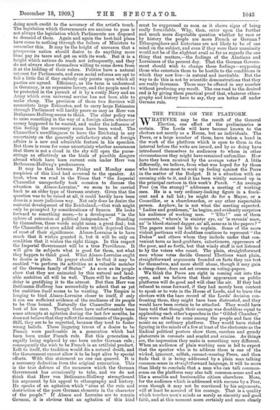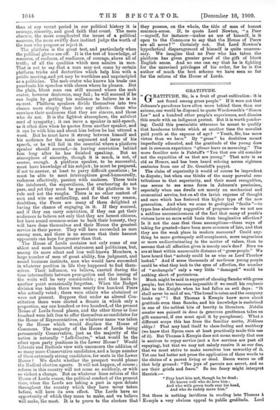THE PEERS ON THE PLATFORM.
IVATEVER may be the result of the General Election, one effect of the preliminaries is certain. The Lords will have become known to the electors not merely as a House, but as individuals. The Peers, or a large number of them, have taken a hand in the work of the platform which is open to them in the interval before the writs are issued, and by so doing have introduced themselves to audiences to whom in other circumstances they might have remained unfamiliar How have they been received by the average voter ? A little differently, we believe, from what was hoped for by those who have done most to work up feeling against the Peers in the matter of the Budget. It is a situation with an amusing side to it, and it has been wittily summed up in the principal cartoon in this week's Punch. "An average Peer (on the stump) " addresses a meeting of working men. He is a very ordinary-looking figure in a frock- coat and a tall hat ; he might do for a Mayor, or a Councillor, or a churchwarden, or any other respectable person. Anyhow, he is not what the meeting expected. "Ladies and. gentlemen," he begins, and evidently surprises his audience of working men. " 'Ullo ! " one of them comments, "where's 'is sinister eye, an' is ravenin' maw, an' is blood-stained dagger, an' all, same as in the papers ? " The papers must be left to explain. Some of the more violent partisans will doubtless continue to represent "the Dukes' and others whom they include under that con- venient term as land-grabbers, extortioners, oppressors of the poor, and so forth, but that windy stuff is not listened to by the voters wlgo count. The plain, straightforward men whose votes decide General -Elections want plain, straightforward arguments founded on facts they can test for themselves, and mere shrill abuse, though it may gain a cheap cheer, does not set crosses on voting-papers. We think the Peers are right in coming out into the open, and we believe that their appearance on public platforms will do good and will clear the air. If they had refused to come forward, if they had merely been content to speak or to vote in the House of Lords, and to leave the electors with the bare record of the Lords' decision con- fronting them, they might have been distrusted, and they would have been certain to be attacked. They would have been told that though their courage was doubtless equal to applauding each other's speeches in the "Gilded Chamber," they were afraid to come among the people and face the music on an ordinary platform. They would have risked figuring in the minds of a few at least of the electorate as the Radical political posters show them, careless and greedy plutocrats in coronets and scarlet and ermine. As things are, the impression they make is something very different. When an audience of plain working men is led to expect that the speaker who is to address them is one of the wicked, ignorant, selfish, coronet-wearing Peers, and then finds that it is being addressed by a plain man talking common-sense in straightforward language, it will be more than likely to conclude that a man who can talk common- sense on the platform may also talk common-sense and act like a sensible and businesslike citizen elsewhere. More, for the audience which is addressed with success by a Peer, even though it may not be convinced by his arguments, will at least be assured of his courage. That is a quality which touches men's minds as surely as sincerity and good faith, and at this moment more certainly and more clearly than at any recent period in our political history it is courage, sincerity, and good faith that count. The more obscure, the more complicated the issues of a political measure, the more swiftly does instinct judge the worth of the men who propose or reject it. The platform is the great test, and particularly when the political gloves are off. It is the test of knowledge, of resource, of coolness, of readiness, of courage, above all of truth ; of all the qualities which men admire in men. That is not to say that a man may not come by certain platform tricks and dexterities which help him with a public meeting, and yet may be worthless and unprincipled as a politician. The mob orator who knows his trade can punctuate his speeches with cheers where he pleases. But the plain, blunt man can still succeed where the mob orator, however dexterous, may fail ; he will succeed if he can begin by getting his audience to believe he is in ea:nest. Platform speakers divide themselves into two classes more simply than into any others : those who convince their audiences that they are sincere, and those who do not. It is the lightest atmosphere, the subtlest cord of sympathy ; it can leave a speaker in mid-speech, as it often does when he quotes from another speaker, and it can be -with him and about him before he has uttered a word. But he must have it strung between himself and his audience for the main argument and issue of his speech, or he will fail in the essential where a platform speaker should succeed,—in leaving conviction behind him long after he has finished speaking. But an atmosphere of sincerity, though it is much, is not, of course, enough. A platform speaker, to be successful, must have knowledge of his subject ; he must be prepared, if not to answer, at least to parry difficult questions ; he must be able to meet interruptions good-humouredly, rudeness effectively, passion with coolness. Those tests the intolerant, the supercilious, the overbearing do not pass, and yet they must be passed if the platform is to rule and not the roughs. There is no other contest of men and wits so enthralling, and for that very reason, doubtless, the Peers are many of them delighted at having the chance of engaging in it. If they succeed, and if they can carry conviction, if they can get their audiences to believe not only that they are honest citizens, but have sound common-sense to back their honesty, they will have done themselves and their House the greatest service in their power. They will have succeeded as men among men, and there is no success that their keenest opponents can hope for greater than that. The House of Lords contains not only some of our ablest and most honoured statesmen and politicians, but, among its more silent and less well-known Members, a large number of men of great ability, fine judgment, and sound business instincts, men who would have succeeded in whatever position in life they happened to find them- selves. Their influence, we believe, exerted during the time intermediate between prorogation and, the issuing of the writs will be very considerable ; and that leads to another point occasionally forgotten. When the Budget division was taken there were nearly five hundred Peers who actually voted ; there were others who abstained or were not present. Suppose that under an altered Con- stitution there were elected a Senate in which only a proportion, say one hundred or two hundred, of the present House of Lords found places, and the other three or four hundred were left free to offer themselves as candidates for the House of Representatives, or whatever name was taken by the House which would displace the House of Commons. The majority of the House of Lords being permanently Conservative, just as the majority of the nation is naturally "Left-Centre," what would be the effect upon party positions in the Lower House ? Would Liberals and Radicals view with unconcern the addition of so many more Conservative candidates, and a large number of them extremely strong candidates, for seats in the Lower House ? We doubt whether the prospect would please the Radical election agents. It will not happen, of course ; reform in this country will not come so suddenly, or with so violent a change. But on whatever lines reform of the House of Lords comes, the political conduct of the present time, when the Lords are taking a part in open debate throughout the country which they have never taken before, will have its own effect. The Lords have an opportunity of which they mean to make, and we believe 'will make, the most. It is to prove to the electors that they possess, on the whole, the title of men of honest common-sense. If, to quote Lord Newton, "a Peer —myself, for instance—makes an ass of himself, is it open to the Commons to say that the House of Peers are all asses ? " Certainly not. But Lord Newton's hypothetical disparagement of himself is quite unneces- sary. We imagine that no Peer who has taken the platform has given greater proof of the gift of blunt English sense. And no one can say that he is fighting for the unrevised privileges of his order, for he is the author of much the best scheme we have seen so far for the reform of the House of Lords.



















































 Previous page
Previous page